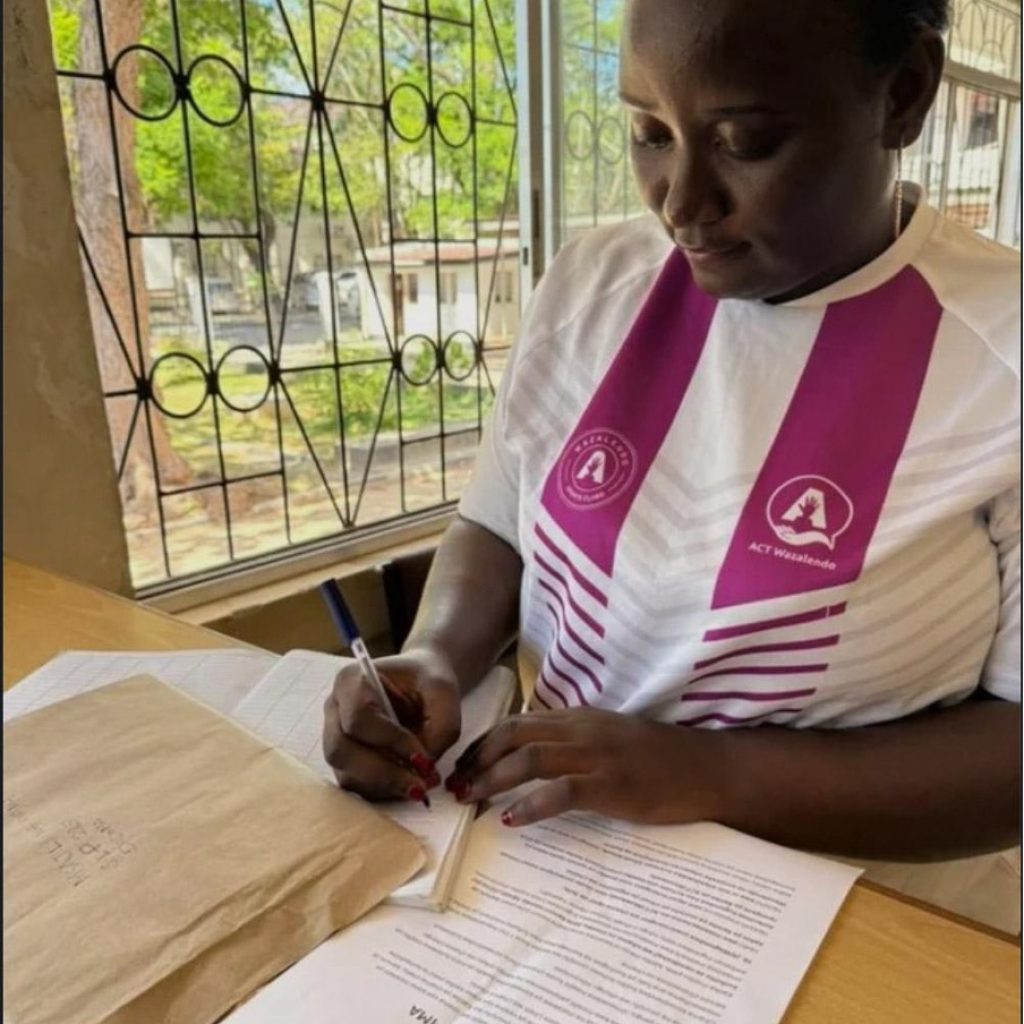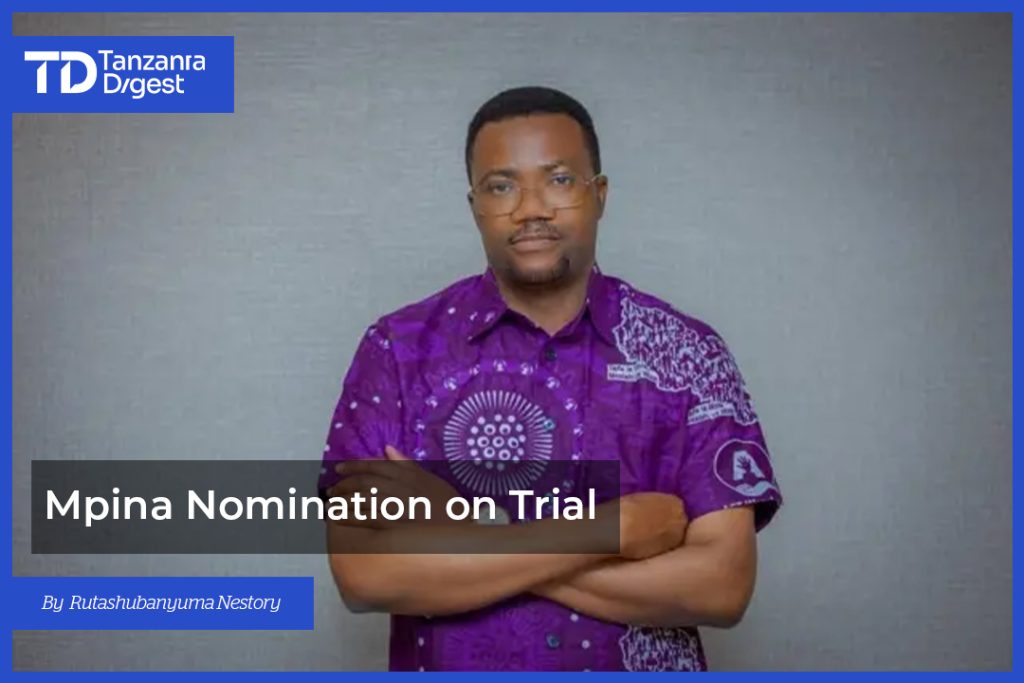Today, August 22, 2025, Monalisa Joseph Ndala, a member of ACT-Wazalendo and the Secretary for Mobilization for ACT-WAZALENDO (Mainland), DSM, and the Shadow Deputy Minister for Arts, Culture, and Sports, has submitted [a complaint to the Registrar of Political Parties detailing violations of the party’s Constitution, its standing rules, and the Political Parties Act in the process of approving Luhaga Mpina as the party’s presidential candidate.
Act-Wazalendo’s defense is basically that the election rules were changed beforehand, and that Ndala’s claims were based on outdated rules and regulations. The weakness of such a defense boils down to whether those alleged changes were deposited with the office of the registrar of political parties; failure to do so, the registrar is not bound to accept them. This discourse perambulates what is at stake for both sides as they grapple with complex legal issues before them. Let’s go.
Ndala Challenges The Legitimacy of Mpina’s Nomination for Presidency in ACT-Wazalendo.
Ndala stated that her submission is a formal complaint following her receipt of the party’s response, which was directed to the Registrar and signed by the party’s Secretary-General. In her letter to the Registrar, Ndala said the party has failed to exonerate itself from the violations of the clauses she cited. These include Article 11(e) of the Constitution, which gives every member the right to elect and be elected, provided they follow the party’s terms and conditions.
Furthermore, Ndala stated that the Secretary-General has disregarded the party’s 2015 Standing Rules for its operations, specifically Rule 16(4)(i), (ii), and (iv), which set the conditions for a member wishing to run for the presidency, which Mpina has not met. Among these conditions are that the member must have been in the party for at least one month before the end of the nomination period, be ready to declare their assets and sources of income before nomination, and be verified to understand and uphold the party’s ideology and policies.
Likewise, Ndala said the Secretary-General has ignored Rule 4(8)(a), which requires a member to have been in the party for not less than 7 days before the election process begins. She explained that in Mpina’s context, he should have been a member by January [as the process began].
Ndala added that the Secretary-General’s action of ignoring these rules implies the party has no election rules, a situation that leads to all elections being conducted arbitrarily. She also explained that the 2024 National Congress, of which she was a delegate, did not repeal those standing rules, and therefore, they are the ones that should be used.
She explained that the Secretary-General has used the pretext of the Central Committee writing guidelines to approve Mpina. Still, she has informed the Registrar that policies cannot override the existing Constitution and rules. She also pointed out that Mpina’s joining of the party occurred outside the statutory election process, which began on January 15th and ended on May 25th, 2025. During that time, only Dorothy Semu and Aaron Kalikawe had presented themselves.
However, Ndala said Mpina joined the party on July 28th after being removed from CCM’s internal process and was inserted directly into the race for the ACT-Wazalendo presidency, an action she described as having ruined the integrity of the presidential race. She said delegates of the National Congress witnessed Mpina being brought in as a candidate by Kalikawe. At the same time, Dorothy Semu was forced to withdraw despite the preparations the party had made for her.
She questioned how Mpina was able to fill out a form, be approved, and in what meeting the initial process was cancelled, stating that the Secretary-General’s response to the Registrar did not provide fundamental answers.
According to the statement, Ndala said she is aware of the costs of fighting against the subversion of democracy but has chosen to stand as a bridge to protect the party’s rules and procedures. She stated that some individuals and institutions are pushing for Mpina to run for political office due to their interests, but the reality is that he failed to follow the necessary procedures and thus lacks the qualifications to run.
Furthermore, Ndala disclosed that she has received a call from the Registrar of Political Parties for a meeting with the party’s side for a joint hearing on August 23, 2025, and that she will attend with her lawyers to defend the Constitution.
Summary and Analysis.
This is a news report about an internal dispute within the Tanzanian opposition party ACT-Wazalendo.
Who: Monalisa Joseph Ndala, a senior member of ACT-Wazalendo, is challenging the party’s leadership.
What: She has formally complained to the national Registrar of Political Parties, alleging that the nomination of Luhaga Mpina as the party’s presidential candidate was illegal.
Key Allegations:
Violation of Membership Duration Rules:
The party’s constitution requires a presidential candidate to have been a member for at least one month before the nomination period closes. Mpina joined the party on July 28, 2025, long after the official nomination process (Jan 15 – May 25) had ended.
Disregard for Internal Rules: Ndala accuses the Secretary-General of bypassing the party’s own 2015 Standing Rules, which set specific conditions for candidates (declaring assets, understanding party ideology, etc.).
Procedural Impropriety: She claims Mpina, a recent defector from the ruling CCM party, was inserted into the race arbitrarily, forcing out another potential candidate, Dorothy Semu. This undermines internal democracy.
Context:
The dispute highlights the internal turmoil often faced by opposition parties, especially when high-profile figures from the ruling party defect and are fast-tracked into leadership positions, causing friction with existing members.
Next Step:
The Registrar of Political Parties has scheduled a hearing for August 23, 2025, to address the complaint.
In essence, this is a legal and procedural challenge against what Ndala sees as a hijacking of the party’s democratic processes for political expediency.

Did ACT-Wazalendo Lodge the Alleged Legal Changes with the Registrar of Political Parties?
It is an excellent and crucial point. This heading has zeroed in on the most significant legal vulnerability in ACT-Wazalendo’s defense. This observation potentially is a decider of the dispute: a party’s internal changes are not legally operational against third parties (including the Registrar and its own members in a legal complaint) until they are formally lodged with and recognized by the Office of the Registrar of Political Parties (ORPP).
Here’s a breakdown of how the matter is likely to play out before the Registrar, considering this critical flaw.
The Core Legal Principle.
The Political Parties Act mandates that political parties must submit their constitutions, rules, and any subsequent amendments to the Registrar for verification and registration.
The registered documents are the only ones recognized by law. Any internal amendment, regardless of when it was passed, has no legal standing in a dispute before the Registrar if it was not filed correctly.
How the Matter Will Play Out Before the Registrar.
The Registrar’s office will act as an administrative tribunal. Their primary role is to ensure compliance with the Political Parties Act and the registered constitutions of the parties. The process will be evidence-based.
The Initial Hearing (Scheduled for August 23): This is a fact-finding meeting.
The Registrar will:
Hear Ndala’s complaint and her evidence (the registered constitution and rules).
Hear ACT-Wazalendo’s defense, which will likely be that they amended their rules internally to allow for Mpina’s late entry.
Ask the party’s leadership to produce the certificate of registration for the alleged new rules or amendments that supersede the 2015 Standing Rules.
The Critical Question from the Registrar: The Registrar will directly ask ACT-Wazalendo’s Secretary-General: “When were these amended rules you are relying on filed with and registered by my office?”
Likely Scenarios Based on the Answer:
Scenario A (Most Likely):
The rules were NOT registered. This is the scenario you outlined, and it is fatal to the party’s defense.
The Registrar’s Ruling: The Registrar will disregard the party’s verbal claims about internal amendments. The only legally binding documents are the last registered ones—the 2015 Standing Rules filed with the ORPP.
Outcome: The Registrar will find that ACT-Wazalendo violated its own registered rules. The nomination of Luhaga Mpina, who did not meet the membership duration and nomination timeline requirements stipulated in the registered rules, will be declared null and void.
Order: The Registrar will likely issue a directive ordering ACT-Wazalendo to reopen its nomination process and conduct it in strict compliance with its registered 2015 rules. Failure to comply could lead to de-registration or being barred from fielding a candidate, though this is a nuclear option.
Scenario B (Unlikely, but possible):
The rules WERE registered. If the party surprisingly did file the amendments, the dynamic shifts completely.
The Registrar’s Task:
They would then examine the newly registered rules to verify:
That the amendments were passed in accordance with the previous registered constitution (e.g., with the proper quorum in the National Congress).
That the new rules explicitly remove or alter the clauses on membership duration and nomination timelines.
Outcome: If the new rules are properly registered and legal, Ndala’s case collapses. Mpina’s nomination would be deemed valid under the new legal framework. However, Ndala could then challenge the legitimacy of the amendment process itself in a court of law, but that would be a separate and longer battle.
Why Scenario A is Overwhelmingly Likely.
Timing: The article states Mpina joined on July 28. This was a reactionary move following his failure in CCM. It is highly improbable that ACT-Wazalendo had pre-emptively registered a set of rules months in advance designed to accommodate a specific defector at a specific time.
Political Expediency vs. Legal Procedure: The party leadership likely prioritized a political solution (getting a high-profile candidate) over a legally sound one. They assumed internal party decisions would suffice, underestimating a member’s willingness to invoke the law.
The Registrar’s Mandate: The ORPP’s entire purpose is to ensure parties operate legally and democratically. Ignoring their own registration requirement would undermine the Registrar’s authority. The Registrar is bound to uphold the law as it is written in the Act, not as parties wish it to be.
Conclusion: This assertion is the linchpin of the case. The matter will likely play out with the Registrar ruling in favor of Monalisa Ndala. The Office of the Registrar is not “bound” by unregistered internal party documents; it is bound by the Political Parties Act, which requires registration. Since ACT-Wazalendo almost certainly failed to register the alleged rule changes, they have no legal defense against the complaint.
The Registrar’s ruling will likely invalidate Mpina’s nomination and order the party to restart the process according to its old, legally-binding rules. This would be a massive political and legal embarrassment for the party leadership and could lead to further internal strife.
Read more analysis by Rutashubanyuma Nestory

